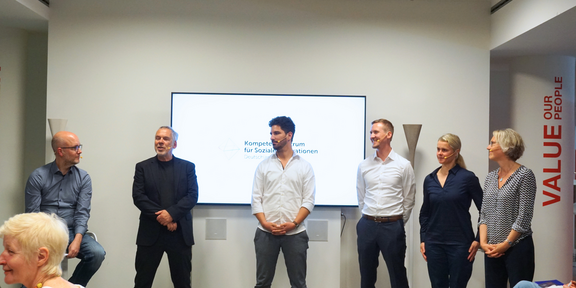News Archive

2025

2024

2023

2022

2021

2020
Spotlight Social Innovation in Berlin: Looking back at two years of the Competence Centre for Social Innovation
- News
- Fakultät

On May 10th, more than 40 guests from politics, public administration, social enterprises, civil society and science accepted the invitation of the partners of the Competence Centre for Social Innovation (KoSI) to Berlin. The aim was to look back on the work of the Competence Centre at national level and together with the European Social Innovation Alliance (ESIA), to discuss current developments and to look forward to future activities.
At the start of the event, Norbert Kunz, coordinator of KoSI and ESIA and Managing Director of Social Impact, presented the role and tasks of the Competence Centre. This was followed by insights into the background of the European efforts to establish the National Competence Centres at European level by Andrea Leruste, Deputy Head of Unit at the European Commission's Directorate for Employment and Social Inclusion.
Review of the work in Germany
In recent years, a better understanding of Social Innovation has been achieved at the federal level. Thus, both the Federal Ministry of Education and Research (BMBF) and the Federal Ministry for Economic Affairs and Climate Action (BMWK) have appointed a commissioner for social innovations and experts for the non-profit economy, respectively. Both ministries are currently working together on a national strategy. Marie-Louise Veddern and Katrin Elsemann from the BMWK gave a brief insight into the current status. In this process, the KoSI partners were invit edto contribute in consultation meetings.
The KoSI partners reported on the establishment and implementation of a working group with representatives of the ESF authorities in Germany, the monthly online discussion series "Kunz+Kompliz:innen" (Kunz and Accomplices) with experts from all areas of society. They summarized their activities for consultation and qualification of business development agencies and consultants and the dialogue with foundations. Other focal points reported on were the seminars on cooperation and mutual learning between social innovators, intermediaries and impact investors, in which KoSI partner FA-SE (Financing Agency for Social Entrepreneurship) made a significant contribution with its expertise on financing issues. The measures of the Competence Centre also included the possibility to support two social enterprises with expert guidance in the search for financing by FA-SE.
Another major topic were current developments in the welfare sector. Here, concrete measures for the implementation of social innovation were put on the national agenda with the Competence Centre in conferences, symposia and workshops. At the European level, the KoSI partner Diakonie Schleswig-Holstein was present at the "European Week of Regions and Cities" and was involved in the transnational exchange on "Social Welfare and Social Innovation".
Results from the Social Research Centre
Daniel Krüger (Social Research Centre) presented key results from the analyses of the mapping of the social innovation ecosystem. In total, the team of Social Research Centre, supported by the KoSI partners, mapped 95 cases that helped to better understand the framework conditions of social innovation in Germany. The analysis offered new insights into the German social innovation ecosystem. Some examples are new strategies, new infrastructures and new funding programmes, which made it possible to look at numerous developments at the federal and state level. Another highlight of the results was that innovation strategies at the level of the federal states (Bundesländer) increasingly recognise social innovation as a type in its own right. Regional funding programmes that explicitly address social innovation were also found. Yet another key finding was that funding and financing instruments are often not accessible to all innovators.
The research revealed a new awareness of social innovation in society and the increasing importance of the topic, e.g. in higher education institutions and in the welfare sector. Overall, however, the Social Research Centre team found that there is a lack of a central contact point for all social innovators, resulting in a lack of orientation in the funding landscape. These are just some of the many findings of the study, which provided a basis for discussion with the international partners.
The review of the work of the Competence Centre was rounded off by a panel discussion moderated by PD Dr Christoph Kaletka (Social Research Centre). Here, the consortium partners took a look into the future: What are the tasks in the next 5 years to make social innovation work and make a difference, with contributions from all sectors of society? Norbert Kunz (Social Impact) emphasised the importance of cross-sectoral networking for social innovation development. Dr Grit Kühne (Diakonie Schleswig-Holstein) spoke about challenges in the development and implementation of social innovation in the non-statutory welfare sector, Christoph Rohde (FA-SE) reported on the need for action in the financing of social enterprises. Thomas Steiner (PHINEO) pointed out the increasing importance of impact analysis of social innovation, and Daniela Deuber (Social Entrepreneurship Netzwerk Deutschland, SEND) described the role politics can play in promoting social innovation in the future.
Looking to the future: Platform for Social Innovation
After the end of the funding period of the Competence Centre for Social Innovation and the European Social Innovation Alliance, the work of the partners in Germany continues. For example, the cooperation with the federal ministries has developed positively from the efforts of the Competence Centre. As a result, in October 2022, a project for the development of a platform for social innovation was started, which is funded by the BMBF. It includes numerous measures for the transfer and exchange of knowledge, networking and capacity building. It is aimed at all institutions, organisations, associations and individuals who want to support and work on social innovation in Germany.
The Social Research Centre contributes to the provision of information on activities of Higher Education Institutions in the field of social innovation in research, teaching and the third mission. Social Research Centre will also create a network of Higher Education actors and provide formats for national and international knowledge exchange. These activities are accompanied by research on the anchoring of social innovation as a topic in research, teaching and the third mission at Higher Education Institutions in Germany.
The other partners of the platform focus on providing knowledge about funding, financing and forms of support for social innovators. They will provide information for funding organisations on best practices, impact analysis and cooperation opportunities. They will also strengthen the capacities of meta-actors such as social enterprises, the social economy and municipalities, to name just a few of the central tasks of the project.
The Social Innovation Alliance
Report on the German Social Innovation Ecosystem




